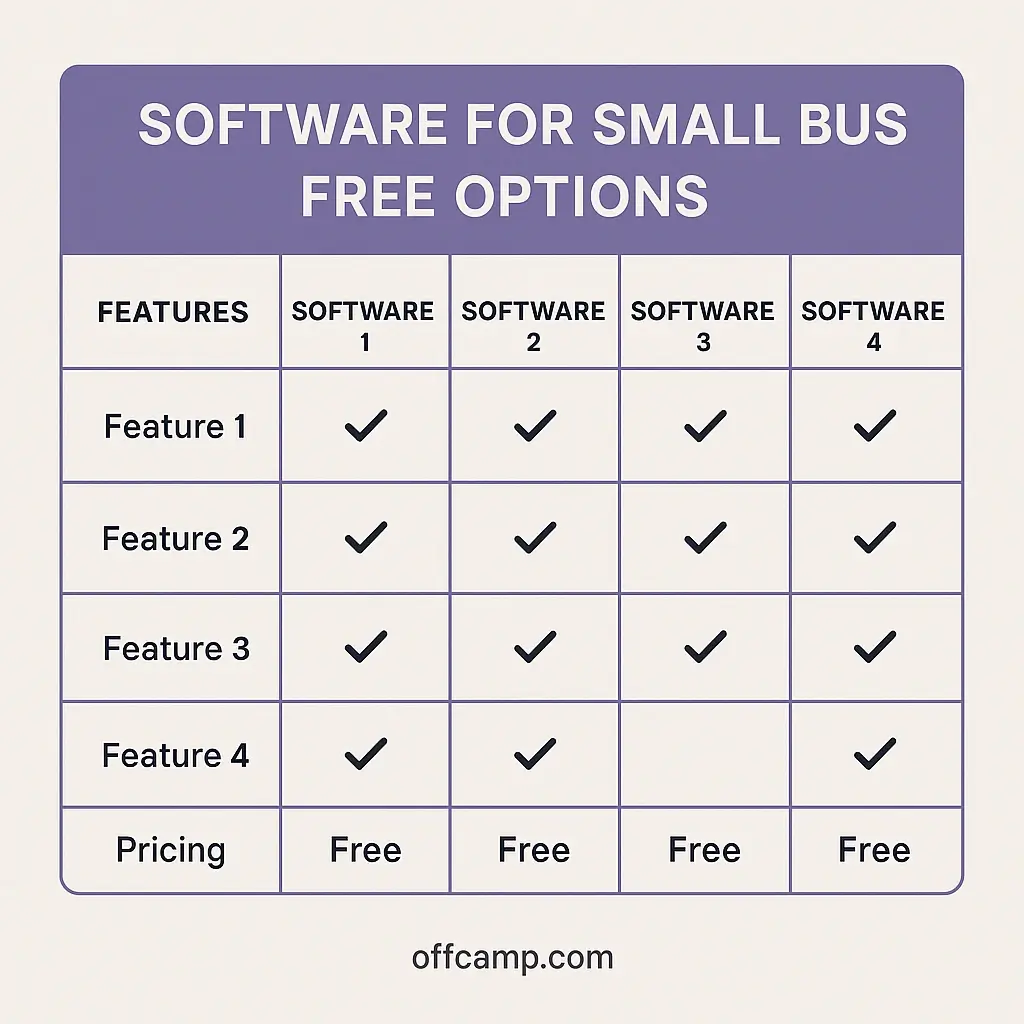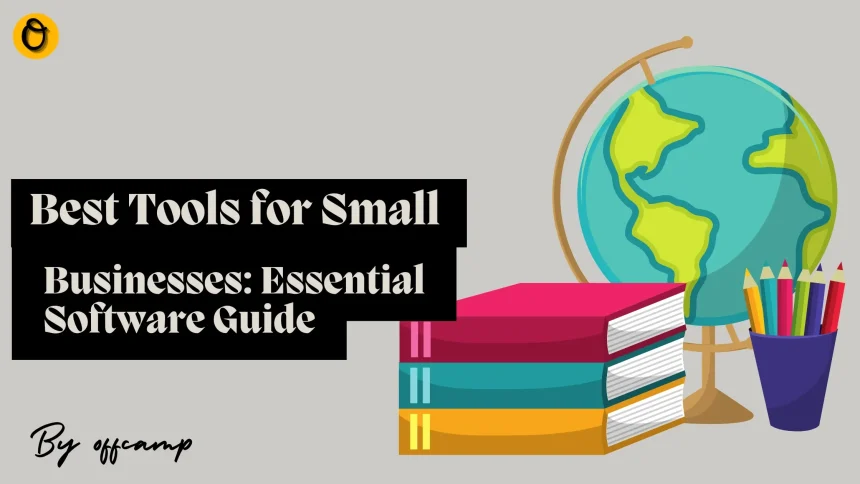Best tools for small businesses are key to your success. In fact, the right software can make the difference between falling behind and scaling.
If you are a solopreneur just starting or managing a growing team, the best tools for small businesses can simplify your operations, increase productivity and free your time to focus what is more important – growing your business.
The problem isn’t getting the business software, but knowing which one offers value while not being too expensive.
With thousands of choices, from free basic platforms to large enterprise solutions, the challenge is picking which small business tools are right for you and your growth goals.
This guide offers an overview of the essential software categories for small businesses, along with software recommendations that have been tried and tested in real life.
You will find solutions for many things such as customer relationships, finance, and more. This will allow you to create a tech stack conducive to sustainable growth.
Understanding Your Small Business Software Needs
Before specific tools it is worth taking stock of problems you currently face and what you hope to achieve in future. Effective tools for small businesses help solve the real problems you face today, but still allow for growth tomorrow.
Start by identifying your biggest pain points. Are you spending too much time on manual data entry? Struggling to keep track of customer communications?
Are project deadlines difficult to manage? Or expense tracking? Most small businesses that are successful have tools under five critical categories: customer relationship management (CRM), financial management, project management, communication tools, and marketing automation.
Your industry and business model will ultimately dictate your investment priorities in the various areas.
Top 10 Business Tools Every Small Business Should Consider
1. Customer Relationship Management (CRM) Software
HubSpot CRM is one of the best tools for small businesses to manage customer relationships. The free app offers free alternative to paid apps, contact management, deals tracking, and email marketing.
Salesforce Essentials has additional and powerful features for growth. Salesforce business tools let you scale with automated workflows, detailed reporting, and integration capabilities.
Why you need this? Nowadays business can have all the sales, marketing, and customer service tools without spending huge overheads. A desktop or cloud solution manages and forwards contacts of your clients into your laptop.
2. Accounting and Financial Management
QuickBooks remains the best accounting software for small businesses. This software lets you create invoices, manage expenses, file taxes, and generate financial reports through easy to use but not accounting tools.
FreshBooks stands out for service businesses, thanks to its great time tracking and invoicing by project capabilities. The platform makes billing easier for consultants, freelancers, and agencies that charge by the hour or project.
Having the right management tools will prevent costly mistakes, ensure you’re on the right side of the taxman, and provide you with insights into the financial health of your business which will assist you making strategic decisions.
3. Project Management and Team Collaboration
The project management platform Asana allows you to track tasks, deadlines, and progress. Teams can coordinate complex projects while never losing sight of individual responsibilities or timelines.
The card based system of Trello is best for visual thinkers. It’s perfect for smaller teams that need some organization without too much complexity.
Project Management Tools Prevent Important Tasks from Falling Through the Cracks and Keep Teams Aligned on Priorities and Deadlines.
4. Communication and Video Conferencing
Slack makes it easy for teams to communicate by using channels instead of emails, with messages stored in history and easily searchable. Integration with other business tools helps create seamless work flows.
Zoom is a reliable video conferencing for client meetings, teamwork, and remote work coordination. The screen sharing and recording features are helpful for business purposes.
Why you need it: As the world turns into more remote and hybrid work arrangements, the communication tool keeps your team connected and productive.
5. Email Marketing and Automation
Mailchimp provides email marketing service that consists of automation workflows, audience segmentation, and analytics. Before needing premium features, growing companies will get help with the free tier.
ConvertKit is an expert email marketing tool built specifically for creators, with tags and automations to power sophisticated marketing campaigns. Email marketing has one of the highest ROI among various marketing channels, and the automation tools allow your customer not to always have contact with you.
All-in-One Small Business Software Solutions

Some businesses want all in one platforms, rather than managing a range of tools. The integrated options can simplify your tech stack through all in one small business software.
Monday.com includes project management, CRM capabilities, and team collaboration – all in one platform. We can alter the software to fit your business model while keeping the basics upright.
Zoho One contains a complete suite of applications for your business, from CRM to accounting to projects to marketing. This integrated method helps ensure smooth data flows across business functions.
Microsoft 365 Business offers widely used productivity tools, as well as advanced email management, file sharing and collaboration that many employees already know how to use. These platforms are best for companies that value simplicity and integration over special features.
But, they may not have the depth of specific tools dedicated to it.
Software for Small Business Free Options
Low cost entrepreneurs can utilize business tools examples without big upfront investment. Many free small business software programs offer a good amount of functionality before requiring payment.
G Suite is Google’s cloud offering that provides free tiers of services like professional email, document collaboration, and cloud storage. These instruments assist in telecollaboration and business communication.
Wave Accounting has the best free accounting software for invoicing, expense tracking, and financial reporting. Great for service business and freelancers who want pro financial management without a monthly fee.
Canva is a Graphic Design Tool That Lets You Create Professional Marketing Materials without Design Skills. The free version has basic design elements and thousands of templates.
Buffer schedules the social media post on various channels and provides basic analytical insights. A small business doesn’t need a marketing staff for consistent social media posts.
These free options usually have upgrade paths as businesses grow, making them a smart and adaptable starting point for your needs.
Industry-Specific Business Tools Examples
Specialized small business tools are available for different industries for their individual needs. Knowing these options allows you to choose which ones are worth it and which are not.
Retail businesses benefit from point of sale systems like Square or Shopify POS that integrate inventory with customer transactions. Through these platforms, you monitor sales, adjust stock levels, and provide customer insight.
Service providers often prefer a scheduling or booking tool like Calendly or Acuity Scheduling maximizes the automated appointment fixing with lesser administrative overhead. Professional Services typically utilize time tracking tools like Toggl or Harvest that facilitate accurate billing and project profitability analysis.
E commerce Businesses commonly use platforms such as Shopify or WooCommerce that allow the online selling of products and help with payment and order processing with less technical complexity. If you choose the right tools that are specific to your industry, they work better than generic counterparts as they’re designed to deal with your specific issue using your useful technology.
15 Examples of Common Business Tools Organized by Category
It helps you identify any gaps in what you have currently and what you still need to invest in.
Financial Management Tools:
- QuickBooks
- FreshBooks
- Wave
- Xero
- Invoice2go
- Expensify
- Receipt Bank
- TaxAct
- Bench
- Mint
- Personal Capital
- YNAB
- PocketGuard
- Goodbudget
- EveryDollar
Customer Management Tools:
- HubSpot
- Salesforce
- Pipedrive
- Zoho CRM
- Insightly
- Copper
- Freshsales
- ActiveCampaign
- Keap
- Nimble
- Close
- Streak
- Nutshell
- Apptivo
- Really Simple Systems
Project Coordination Software:
- Asana
- Trello
- Monday.com
- Basecamp
- Wrike
- ClickUp
- Notion
- Airtable
- Smartsheet
- Teamwork
- ProofHub
- Workfront
- Clarizen
- LiquidPlanner
- TeamGantt
You have tools ranging from simple and free to complex and enterprise level under every category. So you can find various appropriate solutions for your business size and complexity.
Implementation Strategy for Small Business Tools

Incorporating business tools requires deliberate implementation and not trial and error. Use your most pressing needs and tools introduced gradually can keep teams from being burdened.
Phase 1: Core Operations The first step is to integrate the essential tools that will resolve your biggest pain points. That usually means two pieces of software – accounting and CRM, to organize your financial + customer data.
Phase 2: Team Efficiency As projects become bigger, the project management software is used to effectively manage bigger and complex projects. Also, you can add team communication software that enhances collaboration and minimizes miscommunication in teams.
Phase 3: Growth Enablers To facilitate Growth, apply marketing automations, advanced analytics, specialized instruments that enable scaling to improve functionality, rather than just maintain one. With this staged method, we won’t get overwhelmed by too many tools at once, and the implementation of each will be done only when we see value in it – only then will we move to the next tool.
Measuring Success with Your Business Tools
Tools that produce measurable improvements in efficiency, accuracy or growth are the best ones for small businesses. Before implementing new software, find baseline metrics so you can actually measure the impact.
Time savings often provide the most immediate value. Check the time taken to carry out routine tasks before and after the implementation of the tool.
Accuracy improvements reduce costly errors and rework. Keep track of mistake rates in invoicing, inventory control, or customer messaging.
Metrics such as customer acquisition, retention rates, or average transaction value help determine if the tools are helping the business grow. Having regular assessments will make sure your tool stack continues to deliver value while your business evolves.
And it helps identify when it’s time to upgrade or replace something.
Common Mistakes When Choosing Small Business Software
Many entrepreneurs often make the same mistakes when choosing business tools which can waste time and money while complicating matters further.
Over engineering solutions by using an enterprise solution for a simple requirement will lead to more problems rather than less. Begin with simple options and upgrade while increasing demand.
Ignoring integration capabilities will lead to data silos, wherein, data will not flow to other tools. Focus on the platforms that integrate well with one another.
Focusing solely on features rather than usability, you wind up with powerful tools that no one uses. The small business tool will indeed useful and easy to use.
Skipping team input during the selection process often leads to resistance and low take up. Involve actual users in evaluation and decision making.
Neglecting training and onboarding with even the most intuitive tools, you cut the effectiveness and ROI very dramatically. Prepare for learning curves and sufficiently support throughout the transition.
Building Your Custom Small Business Tools Stack
The best small business tool combination depends on your industry, team size, budget and growth plans. Instead of emulating what works for others, solve your own problems.
To start, pen down your existing processes and see what can be improved by technology. This analysis prioritizes selection of tools based on real impact rather than perceived needs.
Think about how different tools will work together in your operations. The best small business software stops complicating your process and integrates with your routine seamlessly.
When budgeting for your business, account for both high upfront costs as well as any ongoing expenses. Remember training time and scaling costs will be involved too, as you grow your business.
Make sure you review and adjust your tools as time goes by.
Future-Proofing Your Technology Investments
Choosing the right tools for small businesses means thinking about the future, as well as what is happening now. Packaged Software Will Have Less Flexibility to Intelligently Scale As the Firm Grows.
Seek suppliers with proven reliability and sufficient financial resources to avoid interruptions from discontinued products or acquired companies. Choose tools that have open APIs and integration functionality to allow greater freedom of choice.
Think about making your data portable and easy to export, so you don’t have problems with one vendor later on. By regularly reviewing your tool stack, you can find areas to optimise and ensure you’re getting the most value.
Frequently Asked Questions About Best Tools for Small Businesses
New ventures usually require accounting software, basic CRM software, and project management first. Basic tools such as financial, customer or task management tools are what every business uses.
Most small businesses spend between 3 to 7% of revenue on software tools, but this can vary massively by industry and model. Begin using free options and slowly upgrade as you generate revenue to support those needs.
All in one tools work with simple operations and small team sizes but solutions that specialize usually do better. Be aware of how well your team can handle technicalities, simplicity or optimizations.
Paid versions are better because they can help you with the following: they provide advanced functionalities, integrations, and support. There are many free tools that can provide enough capability for growing businesses.
Salesforce is great for businesses with complex sales processes, multiple team members handling customers, and needs for advanced automation. Smaller operations often feel a simpler CRM choice is better and cheaper.
Google Workspace, Wave Accounting, HubSpot CRM (free tier), Canva and Buffer are great starting points at no cost. These tools have professional like functionality, enabling businesses to allocate revenues towards growth rather than software.
Involving members of the team in selections, providing enough training, starting simple, and clearly showing “what’s in it for me”. Frequent check ins help ensure challenges are addressed early.
When you reach the limits of a feature, outgrow your support, need advanced integrations, or save enough time. When team sizes grow or businesses get complicated, they will need fine tuned tools.
Making Your Small Business Tools Work Together
The most successful small businesses come together a set of technologies that work well together rather than creating storage silos. By integrating the tool, the overall worth of each tool goes up, while manual work is lessened and chances of error reduced.
Choose tools that will integrate with other business software you use. Today’s platforms usually come with APIs or connectivity to enable easy data sharing between applications.
Try to connect tools that don’t integrate natively using an automation platform like Zapier or Microsoft Power Automate. Actions can be triggered in one tool based on activity in another, creating powerful automated workflows.
It is necessary to document your processes to help your team members understand how certain tools work together. The document also ensures that the tools will be used in the same way across the organization.
With the right set of small business tools, a business can change the way of operating. Finally, you can use time and mental energy to focus on strategy and growth to serve customers better.
Use tools that help with what’s bothering you most to start with. Implement these solutions as thoroughly as possible. Add more tools as your business grows and your needs evolve.
It’s important to remember that often the best tools for small businesses are those that are actually used and have a measurable impact on your operations. Make the right choice, implement carefully, and not only will you profit from better efficiency, increased accuracy, and greater growth potential, but you will also enjoy the benefits of the quality business software you spend your money on.










